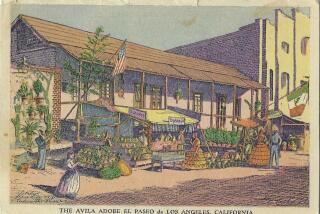VENTURA : Wall of Names of War Victims to Be Preserved
- Share via
Most people put insulation inside the walls of their homes. But Ventura resident Frank Peterson would rather fill the space with a time capsule.
An ardent protester of the U.S. government’s involvement in Central America, Peterson is placing an eight-foot panel inside his garage wall with the names of 100 victims of the decade-long El Salvador civil war that ended in 1991.
“I wanted to leave something for future generations about our involvement in El Salvador’s civil war,” said Peterson, 63. “I don’t want that part of our history to be swept under the carpet 50 years from now.”
The panel is one of 60 that were displayed for three months in 1990 in Los Angeles’ Exposition Park by Peterson, his wife, Lucille Duffy, and other citizens concerned about human rights abuses during a period of tremendous violence in El Salvador.
The wall of panels displayed the names of about 6,000 people who were missing or massacred by death squads. Human rights organizations estimate far more Salvadorans were killed in the bloody war, but Peterson and his friends chose to display only fully documented deaths, he said.
Peterson kept a few panels after the display was taken down, and recently came up with the idea of placing one in the garage wall, partly to help repair a leak.
Working on his house with used materials is nothing new to Peterson, who built the hexagonal home in 1962 with materials salvaged from eight other Ventura homes.
Actually, it was the salvaging work that gave him the idea of placing a time capsule in his wall.
“It was fascinating to find old photographs, letters and even newspapers from 1880 in the old homes,” Peterson said. “I figured why not leave something for the future in my own home?”
A Korean War veteran who worked for 34 years at Point Mugu as a civil engineer, Peterson began his years of protest and promoting peace during the Vietnam War. He and Duffy got involved in El Salvador by delivering medical aid, and Duffy, a nurse, worked in a clinic for several weeks. They say they were arrested six times back home for peacefully protesting U.S. military aid to El Salvador.
Peterson and Duffy talk about Central America with a fervor not often heard since the Reagan years, when the impoverished region became an ideological battlefield of the Cold War. It was a time when a new usage of the word “disappeared” entered the lexicon, referring to peasants who were kidnaped, killed and surreptitiously buried by death squads.
For Duffy, the killings in El Salvador have personal resonance. One friend she made while volunteering at a health clinic was blown up by death squads. Another was “disappeared,” she said.
“Our tax money funded so much violence in Latin America,” Duffy said. “Violence that led to many deaths, including my friends’.”
More to Read
Sign up for Essential California
The most important California stories and recommendations in your inbox every morning.
You may occasionally receive promotional content from the Los Angeles Times.













